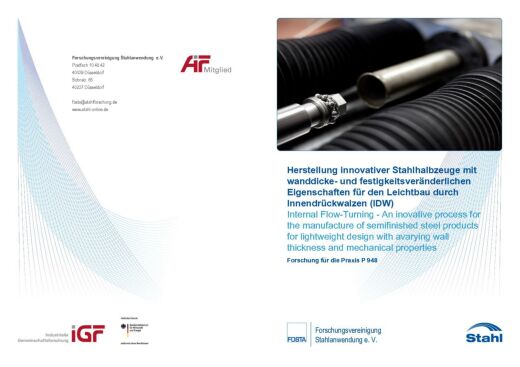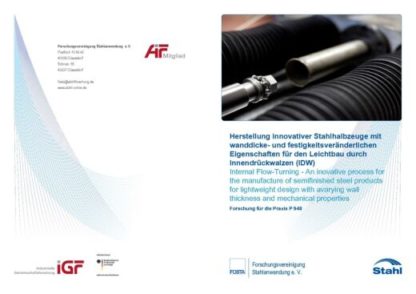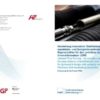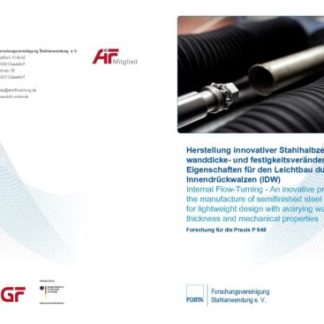Description
P 948 – Internal Flow-Turning – An inovative process for the manufacture of semifinished steel pro-ducts for lightweight design with avarying wall thickness and mechanical properties
Lightweight construction concepts are key approaches to optimise the movement performance and efficiency of structures incorporating moved masses. Rising material costs and the responsible handling of resources (required by society) call for a high level of material efficiency when designing new products. In the case of lightweight construction based on steel solutions, these aims can be achieved in an almost ideal manner through the use of tailored products. Here, optimum use is made of the material in the part through defined local adaptation of the mechanical and geometric properties to the requirements. Projected onto the field of steel tubes and profiles, this gives rise to a high level of demand in respect of the wall thickness contour and the local material properties of adapted semi-finished products. The aim of the underlying research project was thus to investigate tubes of this kind in steel materials in technological terms with the aid of internal flow-turning (IFT).
It was proven in the project that IFT offers unique and flexible options for producing contoured steel tubes with a changing wall thickness together with a constant outside diameter or a specifically contoured outer contour. It should be stressed here that local reductions of up to 80% in wall thickness are possible with IFT. This makes it necessary to apply special process strategies and tool systems, and these were successfully developed in the project – on the basis of the corresponding fundamental investigations. The performance of IFT was also proven through the production of selecteddemonstrators. Hence, it was possible to identify major cost-saving potential in the production of parts produced by internal high-pressure forming for exhaust gas treatment units through the use of specially produced semi-finished products with a suitably aligned wall thickness, manufactured by IFT. In this case, the necessary semi-finished product weight with high-temperature resistant stainless steel (1.4835) was reduced by 20% compared to the series produced part. In addition, through the production of bearing seats on tubes, it proved possible not only to save on material through net shape production with IFT but also to save on ma-chining and thus achieve cost savings too.
The result of the investigations shows that internal flow-turning holds particular potential for the cost-efficient manufacture of high-quality semi-finished products with changeable wall thicknesses and properties, and also for processing parts in steel (with these same properties) as a basis for cost-efficient lightweight construction. Potential fields of application are to be found not only in automotive engineering but, in particular, in aerospace technology, the textile industry and, naturally, in general mechanical engineering.
The research project (IGF-Nr. 17753 N) was carried out at der Fakultät für Maschinenbau, Lehrstuhl für Umformende und Spanende Fertigungstechnik at Universität Paderborn. FOSTA has accompanied the research project work and has organized the project funding from the Federal Ministry of Economics and Technology through the AiF as part of the programme for promoting industrial cooperation research (IGF) in accordance with a resolution of the German parliament.
Only available in german language.
Published in:
2018
Authors:
W. Homberg, E. Wiens




